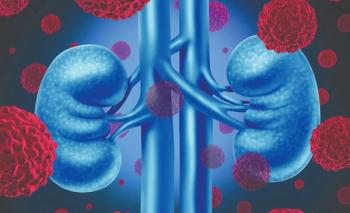
Blood Clots in Abdomen May Be Sign of Cancer
The presence of an abdominal blood clot may be a sign of cancer and may also be associated with poor survival for patients with pancreatic or liver cancers.
The presence of a blood clot in the abdomen may be a sign of previously undetected cancer, according to the results of a new study
Patients diagnosed with splanchnic venous thrombosis (SVT), a form of venous thromboembolism that involves one or more of the three abdominal veins, may require more diagnostic evaluation to test for the presence of a tumor.
The researchers led by Kirstine K. Søgaard, MD, of Aarhus University Hospital in Aarhus, Denmark, analyzed a cohort selected from Danish medical registries that included 1,191 patients who had a first-time SVT between 1994 and 2011. The patients were subsequently followed for cancer diagnoses for a median of 1.6 years. Søgaard and study coauthors examined whether SVT is a marker of occult cancer and could be used as a prognostic factor for cancer survival.
Of the 1,191 patients analyzed, a total of 183 were diagnosed with cancer, of which 95 were diagnosed within 3 months of their SVT diagnosis. Compared with the general population, those diagnosed with SVT are 33 times more likely to be diagnosed with cancer within 3 months. The risk was 2.7-fold higher between 3 and 12 months after an SVT diagnosis.
The 3-month risk of cancer among those with an abdominal clot was 8.0%. The highest risk was for liver cancer (3.5% risk), pancreatic cancer (1.5% risk), and myeloproliferative neoplasms (0.7% risk).
SVT patients diagnosed with liver or pancreatic cancer had poorer 3-month outcomes compared with patients with no detectable blood clots. Three-month survival was 44% in liver cancer patients with SVT compared with 55% in those with no SVT. For patients with pancreatic cancer, the 3-month survival was 35% with SVT vs 53% in those without SVT.
Survival did not differ based on the presence or absence of SVT among those diagnosed with a hematologic malignancy, but there was a higher incidence of myeloproliferative neoplasms more than 12 months after an SVT diagnosis.
Compared with the general population, patients who suffer from deep-vein thrombosis and pulmonary embolism have a two- to four-fold higher risk of a cancer diagnosis within 12 months. A tumor growing adjacent to a vein can cause vein compression, reducing blood flow and generating damage to the blood vessel, which is associated with clotting. However, little was previously known about the link between abdominal vein clots and cancer.
"This study is the first to demonstrate, in a large population, that patients who develop splanchnic venous thrombosis are likely to be diagnosed with cancer within a relatively short time period,” said Søgaard.
Newsletter
Stay up to date on recent advances in the multidisciplinary approach to cancer.















































